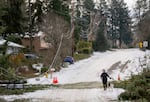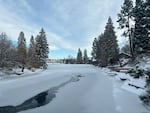
Broken power poles and electrical lines hang along Southwest Leahy Road in Portland, Ore., Jan. 16, 2024.
Kristyna Wentz-Graff / OPB
This week’s weather has been a doozy.
Tens of thousands of people in Oregon and Southwest Washington lost power. More than a dozen people have died in Oregon because of weather-related incidents. We had snow and then ice and then ice again. Is this the new winter normal?
OPB’s Paul Marshall talked with Larry O’Neill, Oregon’s state climatologist, about what we can learn from the weather this week.
Listen to their conversation in the audio player below. The following transcript has been lightly edited for clarity.
Paul Marshall: First of all, how have you been faring in the weather this last week?
Larry O’Neill: It was pretty impactful. We had lost our internet on Saturday morning at the beginning of the storm and it never came back. We were right on the edge of a large power outage. We were really iced in because we live on the top of a hill. We had 4 to 6 inches of ice. Even when taking the dog out to go to the bathroom, you’re definitely risking your life to do that.
We watched a lot of our DVDs and that was all we could do. We read books and played games. I tried to work but it was really hard. These days we basically cannot work without the internet anymore.
Marshall: What lessons do you take as a climatologist from this weather?
O’Neill: When you have a cold air outbreak like this, it’s really what we call a discrepant event. You expect, as the climate warms, that it’s not going to snow anymore. We’re not going to have winter precipitation, it’s going to be always warmer than normal and cold weather won’t happen again.
One thing to take away from this is that cold air outbreaks will occur even though they’re happening less frequently and less often and they’re less intense, but it is still part of our climate and weather variability at this moment in time. Even though they’re happening less often, we can still get them and they could still be quite impactful.

A thin layer of ice covers the Deschutes River in Bend, Ore., on Sunday, Jan. 14, 2024.
Emily Cureton Cook / OPB
Thirty or 50 years ago, we used to get more of these ice storms, more low-elevation snow events in Oregon. The last 20 or 30 years, we haven’t been getting this as often as we used to or as intense as we used to. People have forgotten how to deal with this. When we do get a high-impact cold air outbreak, and storm conditions where we have low-elevation snow and freezing rain like we got this week, people are less adept at dealing with it. This is a lesson about how our perceptions change with time and how we start to forget how the climate used to be in relation to how it is.
Marshall: Part of what has been so intense about this last week is the high winds and freezing rain. Is freezing rain something we should expect because of our climate here?
O’Neill: Freezing rain has always been a natural part of our weather variability especially within the Willamette Valley, but near Hood River, the Columbia River Gorge and then upward into western Washington and really all throughout the Pacific Northwest. We’ve always had these freezing rain events and they’ve always been impactful.
As the climate has been changing, we are still seeing freezing rain events and this can seem counterintuitive. Why is freezing rain still happening? Freezing rain and low snow are projected to lessen in time throughout the valley in the Pacific Northwest, but they won’t ever completely go away. The freezing rain happens because the surface temperatures are below [freezing]. Even though we are having fewer of those below-freezing days, we still have them. Any precipitation that falls there, can create snow or freezing rain.
Marshall: We’ve mentioned climate change. Can the trends in climate change tell us anything about the weather we will experience in winter? Is everything just more unpredictable now?
O’Neill: One of the things that makes the predictability issue a question is because what we predict or experience has been informed by what’s happened historically throughout time. We expect that there’ll be a certain number of really hot days and a certain number of really cold days based on our historical day record and that is what we call our natural climate. What’s happening is that this climate is changing and that we are less able to reliably depend on our past experience to inform our future with weather predictions or predictions about how the climate will go. Things are becoming less predictable because we’re less able to rely on our historical background.

A TriMet bus travels through the intersection of Northeast 74th Street and Fremont Avenue in Portland's Roseway neighborhood on Friday, Jan. 19, 2024.
Courtney Sherwood / OPB
Marshall: Are there things we all should be doing to prepare for future weather? Is there anything you’ve done personally or will be doing going forward?
O’Neill: That’s a good question. One thing we could do both individually and collectively is just looking for ways to reduce our carbon footprint. This can be hard because our society is so centered around fossil fuels and so it could be a little hard to achieve that in practice.
One thing that we can do that seems to be effective so far and is substantial is to try to electrify everything. Getting electric or a hybrid car. Transitioning to an electric heat pump versus natural gas or furnace. Also taking advantage of getting solar panels and things like that.
